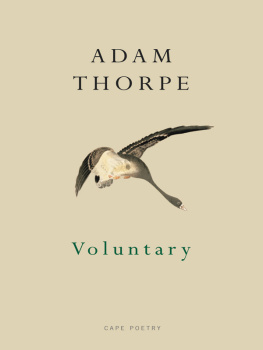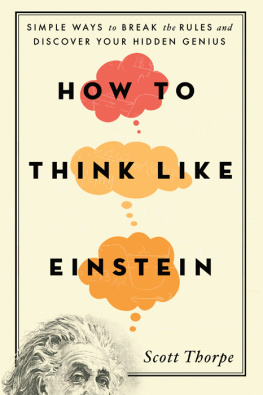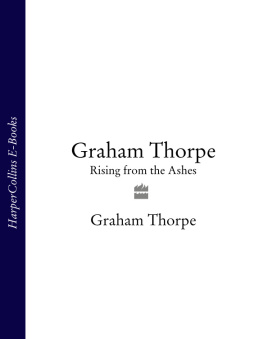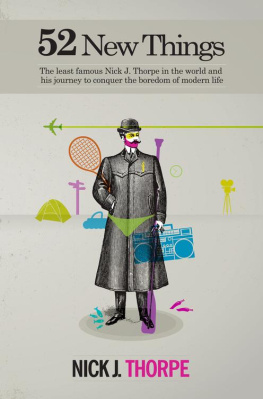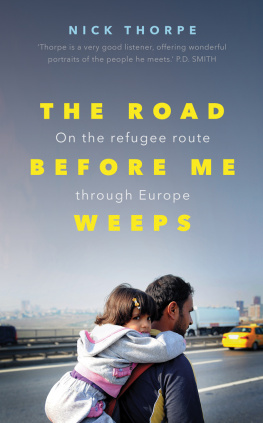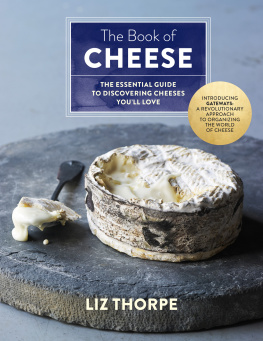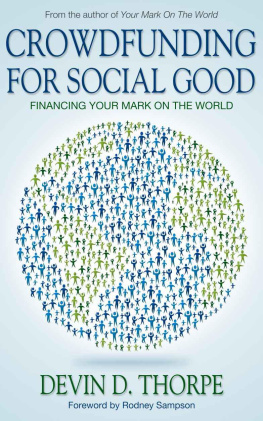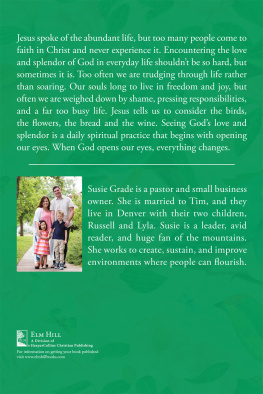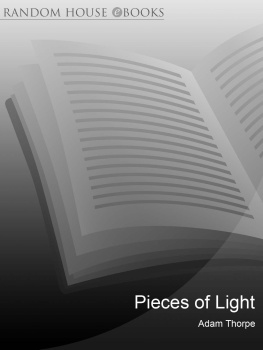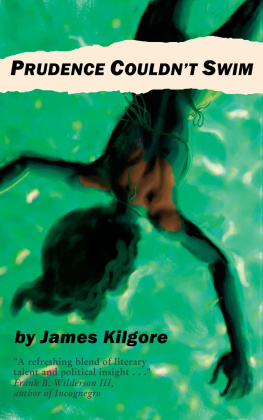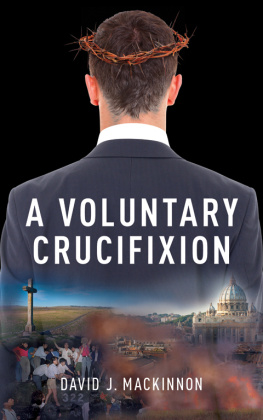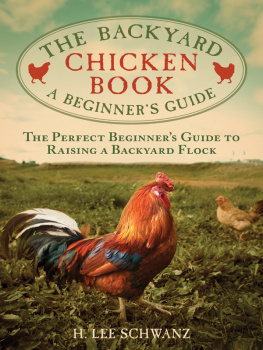CONTENTS
About the Book
From an abandoned rowing boat in Estonia full of wild flowers to a swimming pool in the Congo full of drowned insects, Adam Thorpes new collection takes us on a wide-ranging journey through states of gain and loss, alienation and belonging. In the title poem, the poet disturbs a flock of geese by his mere presence, and one goose takes the wrong direction, away from the flock, as a voluntary exile. A bid for freedom, or a mistake? These poems explore our chances, record our traces in the marks on skin, home movies, stone walls, the pressure of our blood, or the clearing of a dying fathers study: foraging backwards until something is revealed, however tentative. As always in Thorpes work, historys violence lurks in the margins: in the silent oppression of Roman roads, a polluting pipeline in Africa or the bombing of the Alcala train, he takes the gauge of our wider compulsions, of all that decides things for us. Against this he sets what, through the other meaning of voluntary, suggests chances extempore music: the gleeful play of a sea-otter, the extraordinary gift of a passing gull to his small daughter, or poetry itself. Adam Thorpe is now celebrated as a novelist, but he began as a poet.
Voluntary, his sixth collection, is a timely reminder of the elegance, skill and remarkable range of this most gifted English writer.
About the Author
Adam Thorpe was born in Paris in 1956. His first novel,
Ulverton, was published in 1992, and he has written nine others most recently
Flight and two collections of stories. His new translation of
Madame Bovary has just been published by Vintage. He lives in France with his wife and family. ALSO BY ADAM THORPE FICTION
UlvertonStillPieces of LightShiftsNineteen Twenty-OneNo TellingThe Rules of PerspectiveIs This The Way You Said?Between Each BreathThe Standing PoolHodd POETRY
Mornings in the BalticMeeting MontaigneFrom the NeanderthalNine Lessons from the DarkBirds with a Broken Wing TRANSLATION
Madame Bovary in memory of John Fairfax
VOLUNTARY
Adam Thorpe
ACKNOWLEDGEMENTS
Acknowledgements are due to the editors of the following:
Times Literary Supplement;
Poetry Review;
ATOL Art Therapy Online;
Alhambra Poetry Calendar;
Love Poet, Carpenter Michael Longley at Seventy.
Via and Roads Themselves Are Silent were commissioned for broadcast by BBC Radio 3s Between the Ears. I am deeply grateful to the Estonian Writers Union for a grant towards the writing of this volume as well as generous accommodation at the Union House in Ksmu. The brief quote in Second Homers is from the last lines of Rite and Fore-time in David Joness The Anathmata (1952). This ebook is copyright material and must not be copied, reproduced, transferred, distributed, leased, licensed or publicly performed or used in any way except as specifically permitted in writing by the publishers, as allowed under the terms and conditions under which it was purchased or as strictly permitted by applicable copyright law. Any unauthorised distribution or use of this text may be a direct infringement of the authors and publishers rights and those responsible may be liable in law accordingly. No. 954009 A CIP catalogue record for this book is available from the British Library ISBN 9780224094177 www.vintage-books.co.uk
IMPRESSION
The pawprint, bedded on the Roman tile our late neighbour bequeathed us, is deep enough, even on a roofs pitch, to pool rain as petals do or to take a cast from, revive the rough pads that time would have tossed away if the dog had never trotted across those flat, glistening squares of clay laid to dry on the sun-bright turf at the back of the works or hopped rather, for the paws impress is unaccompanied, its claw-dots risen at the sides like fork pricks in dough. 954009 A CIP catalogue record for this book is available from the British Library ISBN 9780224094177 www.vintage-books.co.uk
IMPRESSION
The pawprint, bedded on the Roman tile our late neighbour bequeathed us, is deep enough, even on a roofs pitch, to pool rain as petals do or to take a cast from, revive the rough pads that time would have tossed away if the dog had never trotted across those flat, glistening squares of clay laid to dry on the sun-bright turf at the back of the works or hopped rather, for the paws impress is unaccompanied, its claw-dots risen at the sides like fork pricks in dough.
I like the back of the tegula, too, those arrested shadows of grass and grit: the earths muddle just as it was, two thousand years ago the shabby mongrel, lamish, yelled at; the jobsworth muttering as he crouches down, Itll still keep the rain off. Itll do.
SUTTON HOO
The Overflow Car Parks empty, the light a lustrous grey on birch. The local farmers cut his turf right to the ligeance, so its just this corner, discreetly fenced in wire. A spellbound darkness of firs at the fields edge. Several shaggy swells: which one? With historys mood-swings its hard to tell.
Theres gold for some, though; while my sense of nations less a buried crown than a stain of post-hole, or this viewing rostrum I try to work things out from.
HOME VIDEOS
We run them all through in a glut on the veteran machine, wincing and laughing at what never resembles who we think we are or thought we were, for everything is chafing not to remain, not to get caught in the rut wed quite like to stay in, now we are here. And everyone is still alive; its all a lie, death is. The shock of the young, although we did not feel young then. Our wonder that the boys could ever not have been strong men accompanies our surprise at their five year-old sister sticking her tongue out, stealing their thunder over ten years off from where we are, like a nearby star. Explorers of the Amazon in a garden we hardly recognise (their
cabane of sticks and fruit crates long in oblivion), these children were definitely ours, turn and stare and make faces, as if were the ones that should run away in pretend fright, seeing how fast the passing birthdays go, so resembling each other the off-camera burst at a joke that has vanished forever, the slow lighting of the candles that refuse to light, the pinned donkeys tail in focus at last.
It keeps the detail, unlike memory. Whole swathes obliterated in between cannot be loaded and screened, we know. This is the only stake thats held, and time is mean, and it always stops mid-show, like a lightning strike followed by a blizzard and this triumphant hiss.
SIGHTING
Of course we were always meant to watch its slicked-down head appear and reappear in the Sounds rocky inlet beyond the lanes verge at dusk; but whether it feeds or plays or is simply luxuriating in the violet gloom and glitter of the sea after its dens blind room we have no idea, knowing next to nothing about any creature. It vanishes only to be repeatedly spotted allotted half-an-hour of our lives before the excitement palls and the binoculars are left on the sill, no longer fought for.
FUEL
She has to store five tons to see through winter.
FUEL
She has to store five tons to see through winter.
I offer her a hand, but she waves her own. Shes carrying just a few a day from where they were delivered to the shed: twenty yards. Its early May. Thats a lot of holm-oak (heavy, slow to combust). Shes seventy-odd. It keeps her young, she jokes.
The next time we go past, cep-hunting in November, theres no dog, no greeting, just a sheer cliff of logs in the shed and a few scattered on the grass. She never used a wheelbarrow, I said. Two years on and the stacks still there, along with the dropped ones, now furred with moss, and black. Millennia ago theyd have made a pyre against the greater cold or carried the lot to her tombs shade for time to consume. Sufficient for the life after. Or enough to resume: this was the pith of her, always ahead of the first frost.

